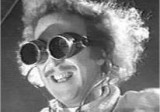Just so you know, Doc...there are a significant fraction of American psychs who believe that a top-down (cognitive therapy - control your thoughts, control your emotions) approach to happiness works better than a bottom up (control your brain chemistry, control your emotions) approach. The battle of cognitive vs. chemical medicine rages daily on the lecture circuit. I was fortunate enough to study that a bit when I went through a depressive episode a number of years back.
I do, however, agree with you that it's completely inaccurate to imagine the brain as a jumble of wires and chemicals completely unaffected by the mind (the unphysical property of humanity that separates us from other animals)
In this fangraphs.com article, Carson Cistulli addresses a couple of great questions. What is it about baseball that gives us so many pleasant hours of watching? And what is it about baseball analysis that holds our attention so well, and gives us so much enjoyment as well?
.
 Q. Is that a "self-indulgent" question?
Q. Is that a "self-indulgent" question?
A. Remarkably, there were readers (such as Nicker and Arsenal) who seemed quite angry that Cistulli should write about, or even think about, this subject.
Is it self-indulgent to ask why baseball makes us happy? I would be much more concerned about my own self-obliviousness, and self-indulgence, if I spent 25,000 hours of my life on a given recreation -- and never once asked whether it was going to be a constructive use of my very finite time allotted. :- )
But that's just me.
.
Q. Does it detract from happiness to try to understand it?
A. (As argued by Arsenal in the comments.)
No. A self-aware man might enjoy eight bottles of ale for the 20th night in a row, and feel transiently happy ... but he would do himself well to ask "what is the nature of my pleasure? Should I drink more or less?"
One constructive use of Cistulli's topic would be to ask, "Should I plan on spending a lot of time on sabermetrics over the next twenty years? Or will I wind up leading a less-happy life than if I had done something else?"
.............
The book of Ecclesiastes devotes a large section of Jewish scripture to the question of, What happens in the long term if I pursue ... education/wisdom ... vs simple hedonism ... vs good cheer and refusing to take anything too seriously ... vs, vs, vs. All of these approaches, according to Solomon who sampled them, produce very different results.
What happens in the long term, if we spend our time on baseball (analysis), as opposed to something else? It's a question worth asking.
.
Q. Is happiness a question of neurology, as the article posits?
A. I certainly hope not. :- )
I hope that such things as love, hope, and courage actually exist.
Cistulli (if I understand him) works from the Western psychiatrist's premise that human happiness is defined in terms of brain-jello-shots of dopamine and seratonin. :- ) He then asks, which events in baseball hit you with those chemicals.
Thoroughly logical, completely secular, and an approach that I find exquisitely 2-dimensional.
If giving your life for your fellowsoldier on the battlefield were exclusively a question of simple chemicals, if my preference for my daughter's company to Saddam Hussein's is exclusively a question of classical conditioning ... life could be compared an animated black-and-white cartoon from the 1950's.
If, however, the concept of human Free Will is introduced, if genuine emotions such as love, loyalty, jealousy, hope and rage are realities, then life takes on a 3-D character and quality.
.
Q. What events in baseball DO get you high?
A. If I were seeking sports highs, I'm not sure I'd pick baseball.
At a Seahawk game, high emotion rules the stands, it rules the field, and it is woven into the rules and fabric of the sport.
Baseball, in my view, is an intellectual game. Its joys are subtler. It has tension and suspense, but even the players themselves seek lack of emotion.
A classical concert has subtle emotion, but in my view the emotions are more evolved than those at a Van Halen concert. In my view, the emotions provoked by baseball are more evolved than those provoked by an 8-man rush with the enemy QB dropping back intot he end zone at Qwest.
Still... Joy of Baseball II
Comments
Psych was the major for a couple of years at the UW. The post is talking about the most common worldview of psychiatrists with M.D.'s.
As you note, there have always been umpteen schools of thought on these subjects.